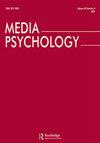父母,公主和权力:基于性别育儿指标的幼儿参与公主和超级英雄文化的研究
IF 2.6
2区 心理学
Q1 COMMUNICATION
引用次数: 0
摘要
公主和超级英雄都是美国早期儿童的重要组成部分。由于公主和超级英雄的性别特征,他们可能代表了儿童早期性别环境的一个突出方面,并且可能与性别教育的其他方面有关。本研究的目的有两个:(1)利用潜在特征分析(Latent Profile Analysis, LPA)对幼儿参与公主和超级英雄文化的模式进行分类;(2)研究儿童参与公主和超级英雄文化的特征是否与性别育儿指标有系统的关联;对男孩型和女孩型游戏的认可,父母对性别的含蓄态度,以及父母对孩子使用性别语言。我们以404对亲子为样本,完成了对儿童与公主和超级英雄互动的潜在特征分析,确定了四种特征:低参与度、公主、英雄和高参与度。儿童的性别与其参与程度相关,但除了父母对女孩型游戏的认可外,性别育儿的指标并不能预测儿童对公主/超级英雄的参与程度。最后,儿童性别并没有调节性别育儿指标与儿童公主/超级英雄参与的关系。披露声明作者未报告潜在的利益冲突。数据可用性声明数据和语法在requestNotes1时可用。注意,这些效应值四舍五入到相同的百分位。我们感谢杨百翰大学的家庭生活学院和家庭、家庭和社会科学学院,以及许多帮助这个项目的私人捐助者的慷慨支持。本文章由计算机程序翻译,如有差异,请以英文原文为准。
Parents, Princesses, and Powers: An Examination of Young Children’s Engagement with Princess and Superhero Culture Based on Indicators of Gendered Parenting
ABSTRACTBoth princesses and superheroes are highly salient parts of early childhood in the United States. Because of the gendered nature of both princesses and superheroes, it is possible that they represent a salient facet of children’s early gendered environments, and may be associated with other facets of gendered parenting. The aim of this study is twofold: (1) to categorize patterns of young children’s engagement with princess and superhero cultures using Latent Profile Analysis (LPA) and (2) to examine whether children’s profiles of engagement with princesses and superheroes are systematically associated with indicators of gendered parenting; approval of boy-typed and girl-typed play, parents’ implicit attitudes about gender, and parents use of gendered language with their children. Using a sample of 404 parent–child dyads, we completed a Latent Profile Analysis of children’s engagement with princesses and superheroes, identifying four profiles, Low Engagement, Princesses, Heroes, and High Engagement. Children’s gender was related to their profile of engagement, but indicators of gendered parenting were not predictive of children’s profile of princess/superhero engagement, apart from parent approval of girl-typed play. Finally, child gender did not moderate the relationship between indicators of gendered parenting and children’s profile of princess/superhero engagement. Disclosure statementNo potential conflict of interest was reported by the authors.Data availability statementData and syntax is available upon requestNotes1. Note, these effect sizes rounded to the same hundredths place.Additional informationFundingWe thank the School of Family Life, and the College of Family, Home, and Social Sciences at Brigham Young University and the generous support of the many private donors who aided with this project.
求助全文
通过发布文献求助,成功后即可免费获取论文全文。
去求助
来源期刊

Media Psychology
Multiple-
CiteScore
8.60
自引率
7.10%
发文量
30
期刊介绍:
Media Psychology is an interdisciplinary journal devoted to publishing theoretically-oriented empirical research that is at the intersection of psychology and media communication. These topics include media uses, processes, and effects. Such research is already well represented in mainstream journals in psychology and communication, but its publication is dispersed across many sources. Therefore, scholars working on common issues and problems in various disciplines often cannot fully utilize the contributions of kindred spirits in cognate disciplines.
 求助内容:
求助内容: 应助结果提醒方式:
应助结果提醒方式:


